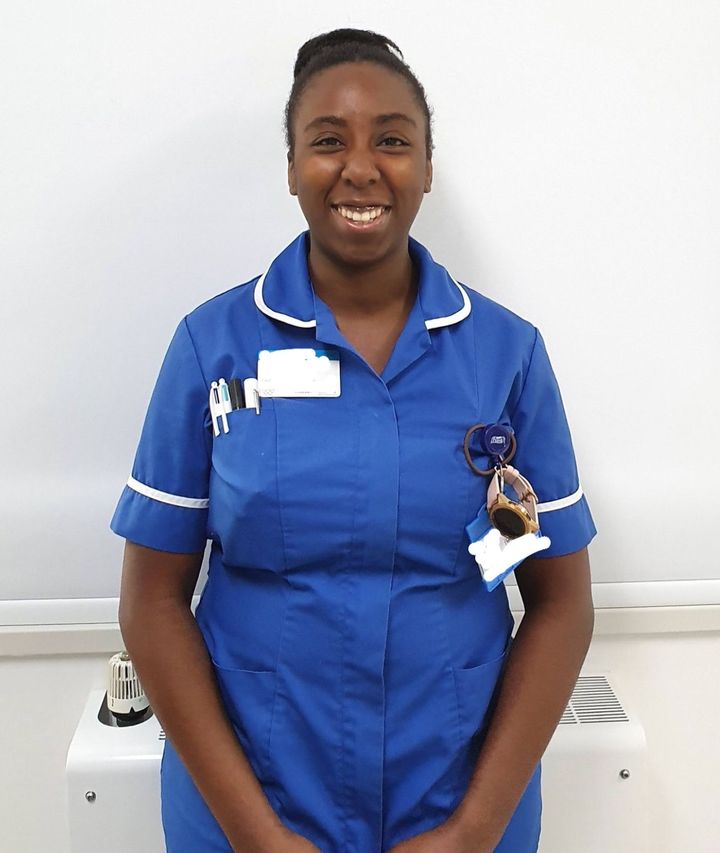During medical training, in health textbooks, in posters or at the doctor’s office, we often see health conditions or body parts represented with white figures.
Many of these images seem outdated or inaccessible to large parts of the population. Now, one medical student has taken matters into his own hands.
Advertisement
Chidiebere Sunday Ibe, 25, from Ebonyi State, Nigeria, began illustrating Black patients, children and babies. Recently, his drawing of a Black foetus and mother has gone viral on Twitter and TikTok, amassing hundreds of thousand views and likes.
The image has clearly struct a real chord with people, especially those not accustomed to seeing their skin tones reflected in standard medical imagery.
Advertisement
The aspiring neurosurgeon wanted to show people what certain conditions look like for Black people – and also normalise the diversity of our bodies.
For some people, it was the first time they’d seen a Black foetus and many called for more representation like this.
Advertisement
When we spoke to Ibe about his illustrations, he told HuffPost UK: “This image was created like every other image, I never expected it to be viral. The whole purpose was to keep talking about what I’m passionate about – equity in healthcare – and also to show the beauty of Black people.
“I feel great seeing it going viral, I never expected it and it feels good that the message is out and it will challenge current systems.”
Ibe points out that we need to see more images like this, and more people behind the scenes creating them.
“We don’t only need more representation like this, we need more people willing to create representation like this, this would help make such images more accepted,” he says.
Advertisement

Chidiebere Ibe
For Black people working in healthcare, seeing Ibe’s images has meant a lot – it’s not often they see their race reflected in the industry. Rebekah Agboola, a 27-year old nurse from London, says the picture made her do a double-take.
“The image was shocking,” she tells HuffPost UK. “I’ve never seen a Black baby in an image like this before – it makes you take a second look. It shouldn’t be shocking as it’s a simple medical illustration. However, having started my journey into this world as a sixth form student looking at medical images, I didn’t commonly see illustrations of Black and brown people unless it was something to do with skin conditions and even then it was rare.”
Agboola says such illustrations go beyond representation to having a positive impact on people’s health and wellbeing.
“I think that it is important to make sure that there is more representation because it will greatly improve the treatment of our patients,” she says.
In August 2020, as part of Black Ballad’s weeklong takeover of HuffPost UK, Black women spoke out about the discrimination, microaggressions and substandard care they received during pregnancy, shining fresh light on the findings of a major motherhood survey, also conducted by Black Ballad.
“Routinely, Black and other minority patients do not receive the same care due to initial symptom presentation and if it is made clearer that our symptoms can sometimes look different and that clinicians need to give their examinations more thought we can help reduce this issue,” Agboola says.
“This picture shocked me but I was so glad to see it and want to see more.”

Rebekah Agboola
Since the release of Ibe’s pics, the Royal College of Midwives (RCM0, has also said it will be amping up efforts to diversify.
Jane Bekoe, the RCM lead on its Race Matters programme, told us: “Positive representation of race is important in all aspects of our lives and society, because the world should reflect accurately all the people living in it. This applies just as much to portrayals of Black and minority ethnic people within healthcare, so illustrations such as this are a positive and necessary step forward towards real equality for us all.”
The RCM is working to ensure changes happens, Bekoe added, following its first celebration of Black History and Culture Month this year. In January 2022, it will hold a webinar on decolonising the midwifery curriculum, which will be led by the RCM’s student midwife forum.
Advertisement
Here’s hoping things do actually change.





